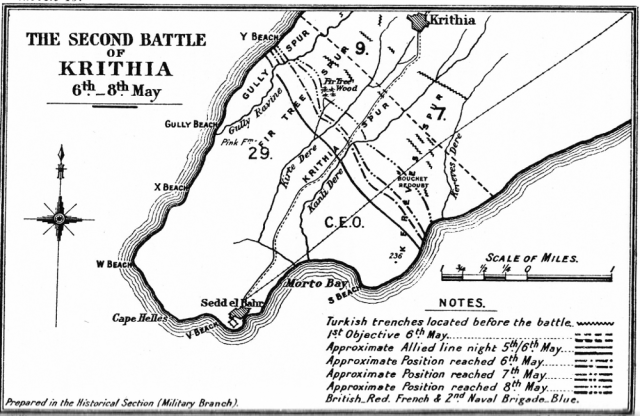By yesterday, the 29th Indian Brigade and some of the 42nd Division had arrived from Egypt as reinforcements and the stable situation at Anzac Cove made it possible for 6000 men to be transferred to Helles. Hamilton therefore felt strong enough to make another attempt to capture Achi Baba. After a completely inadequate bombardment (British munitions were by now severely depleted), the Second Battle of Krithia was launched this morning with inauspicious delays.
Unfortunately, the plan was the same as on 28 April and not much more effective. The French had their usual problems advancing on Kereves Dere (Gully) in the east, after which the ‘pivoting’ of the British 29th Division around the French to take Krithia and Yazy Tepe was bound to be complicated. The advance of the 88th Brigade along Fir Tree Spur was soon checked by well-concealed machine-gun posts and the 125th Brigade on the extreme left at Gully Spur also made little progress today.
The map vividly demonstrates the collapse of the whole initiative:
The ‘1st Objective’, i.e. for today, was a line one mile nearer to Krithia. In fact, as a result of exhaustion, poor communications, low munitions, difficulty in locating the enemy, chaotic attacks, enfilading and front-on slaughter, after three days the Allies had advanced just over a third of a mile. In the course of the Second Battle of Krithia the Allies lost about 6500 men, the Anzacs and Royal Naval Division suffering particularly badly.
By now at Gallipoli the expeditionary force had sustained total casualties of over 20,000 — approximately 30 per cent of its entire capacity. Yet the two bridgeheads ‘scarcely covered five square miles between them’ (Alan Moorehead).
One cannot deny that Hamilton fully appreciated his predicament. The operation had been a ‘failure’, he wired Kitchener, and ‘more and more munitions’ would be needed to destroy the fortifications and machine-gun posts ranged against his troops.
If you could only spare me two fresh divisions organized as a corps, I could push on with great hopes of success both from Cape Helles and Gaba Tepe; otherwise I am afraid we shall degenerate into trench warfare with its resultant slowness.
The last statement was all too prophetic.
Next entry: 7 May 1915: Farewell to friends























